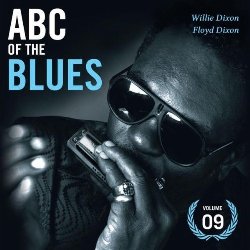ABC of the Blues CD9 (2010)
ABC of the Blues CD9 (2010)

CD 9 Willie Dixon & Floyd Dixon 09-01 Willie Dixon – Don’t Let That Music Die 09-02 Willie Dixon – I Ain’t Gonna Be Your Monkey Man 09-03 Willie Dixon – Money Tree Blues 09-04 Willie Dixon – Since My Baby Gone 09-05 Willie Dixon – No One to Love Me 09-06 Willie Dixon – Hard Notch Boogie Beat 09-07 Willie Dixon – If the Sea Was Whiskey 09-08 Willie Dixon – Got You on My Mind 09-09 Willie Dixon – Tell That Woman 09-10 Willie Dixon – Come Here Baby play 09-11 Floyd Dixon – Dallas Blues 09-12 Floyd Dixon – Moonshine 09-13 Floyd Dixon – Real Lovin’ Mama 09-14 Floyd Dixon – Prairie Dog Blues play 09-15 Floyd Dixon – Shuffle Blues 09-16 Floyd Dixon – Blues for Cuba 09-17 Floyd Dixon – Telephone Blues 09-18 Floyd Dixon – Lovin’ 09-19 Floyd Dixon – Let’s Dance 09-20 Floyd Dixon – Opportunity Blues
William James "Willie" Dixon (July 1, 1915 – January 29, 1992) was an American blues musician, vocalist, songwriter, arranger and record producer. A Grammy Award winner who was proficient on both the Upright bass and the guitar, as well as his own singing voice, Dixon is arguably best known as one of the most prolific songwriters of his time. Dixon is recognized as one of the founders of the Chicago blues sound. His songs have been recorded not only by himself, or that of the trio and other ensembles in which he participated, but an uncounted number of musicians representing many genres between them.
A short list of his most famous compositions include "Little Red Rooster", "Hoochie Coochie Man", "Evil", "Spoonful", "Back Door Man", "I Just Want to Make Love to You", "I Ain't Superstitious", "My Babe", "Wang Dang Doodle", and "Bring It On Home". They were written during the peak of Chess Records, 1950–1965, and performed by Muddy Waters, Howlin' Wolf, and Little Walter, influencing a worldwide generation of musicians.
Next to Muddy Waters, he was the most influential person in shaping the post World War II sound of the Chicago blues. He also was an important link between the blues and rock and roll, working with Chuck Berry and Bo Diddley in the late 1950s. His songs were covered by some of the biggest artists of more recent times, including Styx, Bob Dylan, Cream, Jimi Hendrix, Led Zeppelin, Foghat, The Yardbirds, The Rolling Stones, Queen, Megadeth, The Doors, The Allman Brothers Band, Grateful Dead, and a posthumous duet with Colin James.
Floyd Dixon (February 8, 1929 – July 26, 2006) was an American rhythm and blues pianist and singer.
He was influenced by blues, gospel, jazz and country music growing up. Self-dubbed "Mr. Magnificent," Dixon signed a recording contract with Modern Records in 1949, specializing in jump blues and sexualized songs like "Red Cherries", "Wine Wine Wine", "Too Much Jelly Roll" and "Baby Let's Go Down to The Woods". When Brown left Johnny Moore's Three Blazers in 1950 to go solo, Dixon replaced him as pianist and singer and recorded with the band for Aladdin Records. Staying with the record label, Dixon had a small hit under his own name in 1952 with "Call Operator 210".
In the 1970s Dixon left the music industry for a quieter life in Texas, though he did occasional tours in the 1970s and 1980s. In 1984 he was commissioned to write "Olympic Blues" for the 1984 Summer Olympics. In 1993, Dixon received a Pioneer Award from the Rhythm and Blues Foundation.
Zmieniony (Niedziela, 22 Styczeń 2012 10:42)








